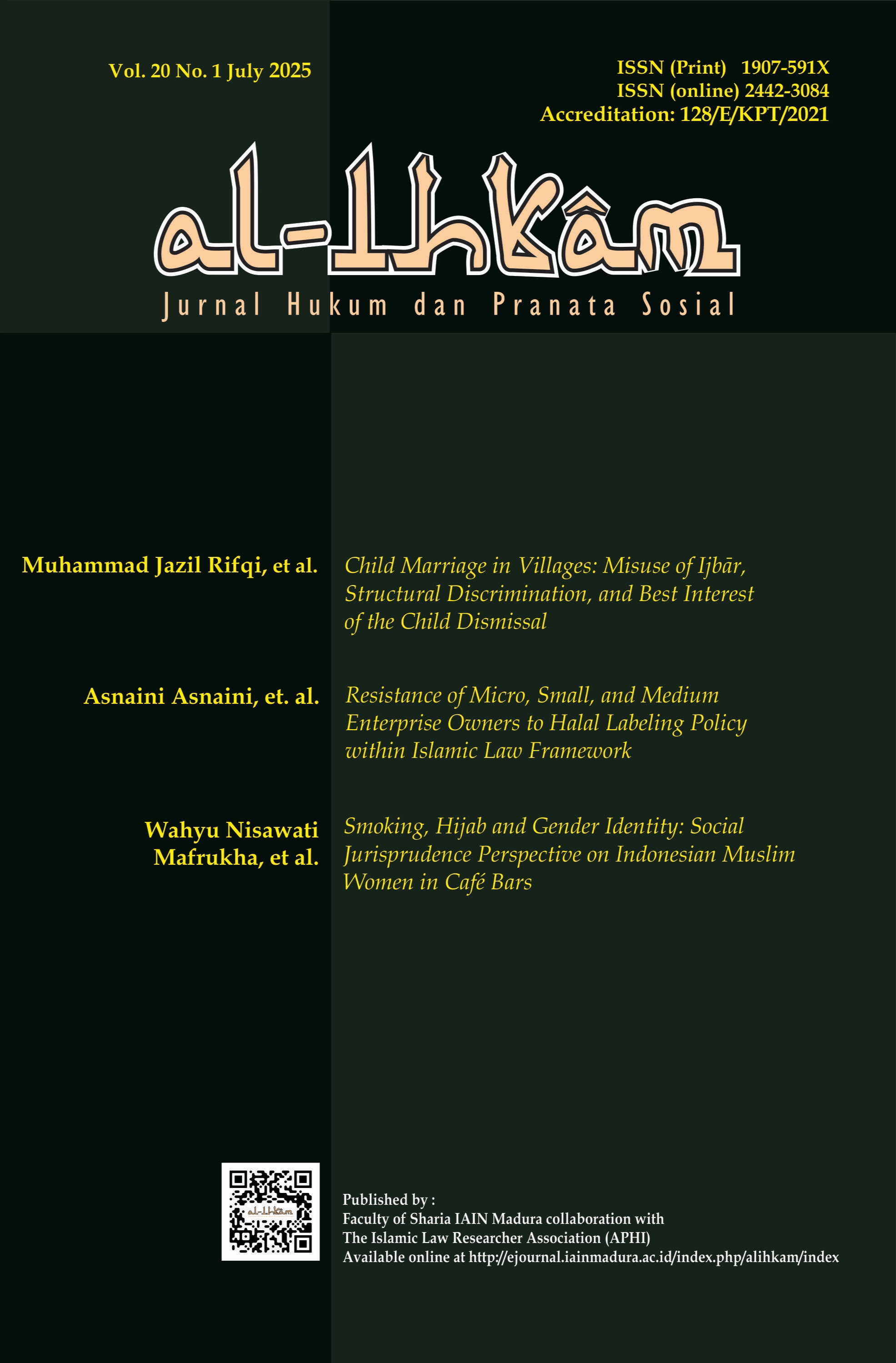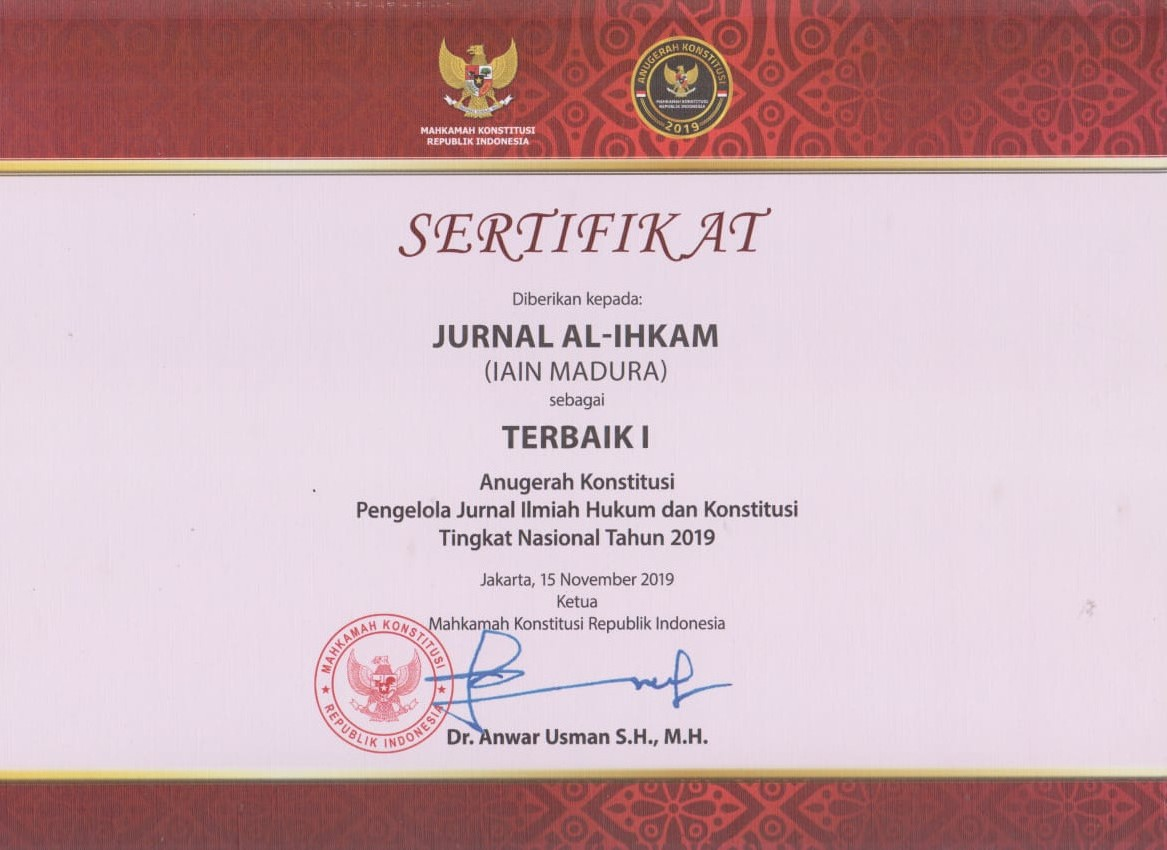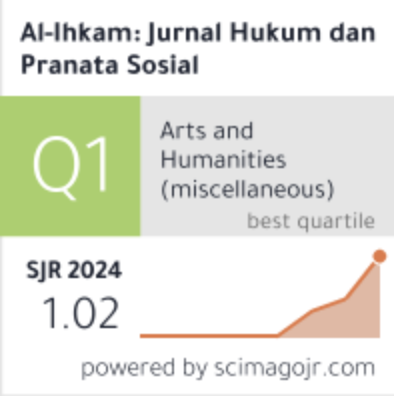Resistance of Micro, Small, and Medium Enterprise Owners to Halal Labeling Policy within Islamic Law Framework
 Abstract views: 712
,
Abstract views: 712
,
 PDF downloads: 353
PDF downloads: 353
Abstract
This study analyzes how resistance to halal labeling policies among Micro, Small, and Medium Enterprises (MSME) owners has influenced the experiences and challenges in educating about and implementing halal food policies in Indonesia, and even globally, particularly among food and beverage providers serving daily meals to the public. The MSME owner respondents interviewed for this study have been operating their businesses for a relatively long time and have been selling food and beverages without a halal label. A questionnaire was used to collect data on the reasons for rejection and its prevalence. Semi-structured interviews were conducted to explore key topics within thematic narratives. The research found that MSME owners’ resistance to halal labeling occurred covertly. This resistance stemmed from the miscommunication of the halal labeling policy and the differing understanding of halal standards among MSME owners, religious perspectives, and government regulations. Objections to the complex procedures and costs involved were also significant factors contributing to this resistance. MSME owners have not yet recognized the benefits of halal labeling for business growth and innovation, and instead, focus primarily on the immediate survival of their businesses to meet daily needs. MSMEs need assistance from other parties to advance and innovate. The resistance and contestation of halal values in MSMEs could potentially lead to violations of the principles of Islamic law, particularly in production and consumption.
Downloads
References
Abdallah, Ali, Mohammed Abdel Rahem, and Antonella Pasqualone. “The Multiplicity of Halal Standards: A Case Study of Application to Slaughterhouses.” Journal of Ethnic Foods. Journal of Ethnic Foods, 2021. https://doi.org/10.1186/s42779-021-00084-6.
Abdellatif, Mahmoud M., Binh Tran-Nam, and Boumediene Ramdani. “The Simplified Tax Regime for Micro and Small Enterprises in Egypt: An Analysis of the Theoretical and Implementation Issues.” Journal of the Australasian Tax Teachers Association 16, no. 1 (2021): 38–63. http://hdl.handle.net/10576/40514.
Abowitz, Kathleen Knight. “A Pragmatist Revisioning of Resistance Theory.” American Educational Research Journal 37, no. 4 (2000): 877–907. https://doi.org/10.3102/00028312037004877.
Ahmed, Ahmed Salem, and Muhammad Taufiq. “Manâfidu al-Muharramât ilâ Muntijâti al-Halâl: “Dirâsah Tahlîliyah fî Dhaw’i Ma’âyir Majma’ al-Fiqh al- Islâmî al-Dawlî wa al-Ma’âyir al-Mâlayziah.” Al-Ihkam: Jurnal Hukum dan Pranata Sosial 16, no. 1 (2021): 230–50. https://doi.org/10.19105/al-lhkam.v16i1.3050.
Allison, Safwaan Zamakda. “Socialisation and Character Education in the Muslim World: Exploring the Role, Impact, and Necessity of Indoctrination.” IJoReSH: Indonesian Journal of Religion, Spirituality, and Humanity 3, no. 1 (2024): 76–100. https://doi.org/10.18326/ijoresh.v3i1.76-100.
Alzeer, Jawad, Ulrike Rieder, and Khaled Abou Hadeed. “Rational and Practical Aspects of Halal and Tayyib in the Context of Food Safety.” Trends in Food Science and Technology 71, no. August 2017 (2018): 264–67. https://doi.org/10.1016/j.tifs.2017.10.020.
———. “Rational and Practical Aspects of Halal and Tayyib in the Context of Food Safety.” Trends in Food Science and Technology 71 (2018): 264–67. https://doi.org/10.1016/j.tifs.2017.10.020.
Amara, Mahfoud. “Sport, Islam, and Muslims in Europe: In between or on the Margin?” Religions 4, no. 4 (2013): 644–56. https://doi.org/10.3390/rel4040644.
Ambali, Abdul Raufu, and Ahmad Naqiyuddin Bakar. “People’s Awareness on Halal Foods and Products: Potential Issues for Policy-Makers.” Procedia - Social and Behavioral Sciences 121, no. 1 (2014): 3–25. https://doi.org/10.1016/j.sbspro.2014.01.1104.
Anggadwita, Grisna, Dini Turipanam Alamanda, and Veland Ramadani. “Halal Label vs Product Quality in Halal Cosmetic Purchasing Decisions.” Ikonomika 4, no. 2 (2020): 227–42. https://doi.org/10.24042/febi.v4i2.5897.
Annisa, Arna Asna. “Kopontren dan Ekosistem Halal Value Chain.” Jurnal Ilmiah Ekonomi Islam 5, no. 01 (2019): 1. https://doi.org/10.29040/jiei.v5i01.398.
Asnaini, Zulkarnain, Yunida Een Fryanti, and Heru Apriliansyah. “Implementation of the Penta Helix Concept in the Waste Management of Social and Economic Value in Kota Bengkulu.” The 4th International Conference on University Community Engagement 4 (2022): 140–50. https://icon-uce.com/index.php/icon-uce/article/view/20.
Batubara, Chuzaimah, and Isnaini Harahap. “Halal Industry Development Strategies Muslims’ Responses and Sharia Compliance in Indonesia.” Journal of Indonesian Islam 16, no. 1 (2022): 103–32. https://doi.org/10.15642/JIIS.2022.16.1.103-132.
Dhalaria, Pritu, Himanshu Arora, Ajeet Kumar Singh, Mansi Mathur, and Kumar S. Ajai. “Covid-19 Vaccine Hesitancy and Vaccination Coverage in India: An Exploratory Analysis.” Vaccines 10, no. 5 (2022): 1–19. https://doi.org/10.3390/vaccines10050739.
Edwards, Ben, Nicholas Biddle, Matthew Gray, and Kate Sollis. “Covid-19 Vaccine Hesitancy and Resistance: Correlates in a Nationally Representative Longitudinal Survey of the Australian Population.” Plos One 16, no. 3 (2021): 1–11. https://doi.org/10.1371/journal.pone.0248892.
Fahmi, Syaifuddin. “Halal Labeling Effect on Muslim Consumers Attitude and Behavior.” In Proceedings of the 2017 International Conference on Organizational Innovation (ICOI 2017), 131:56–62. Paris: Atlantis Press, 2017. https://doi.org/10.2991/icoi-17.2017.26.
Fischer, Johan. “Forging New Malay Networks: Imagining Global Halal Markets.” Focaal 2018, no. 80 (2018): 91–104. https://doi.org/10.3167/fcl.2018.800107.
Furqani, Hafas, Gunawan Adnan, and Ratna Mulyany. “Ethics in Islamic Economics: Microfoundations for an Ethical Endogeneity.” International Journal of Ethics and Systems 36, no. 3 (August 2020): 449–63. https://doi.org/10.1108/IJOES-03-2020-0032.
Fuseini, A. “The Brain, Unconsciousness and Death: A Critical Appraisal with Regard to Halal Meat Production.” Animal Welfare 28, no. 2 (2019): 165–71. https://doi.org/10.7120/09627286.28.2.165.
Harapan, Harapan, Raisha Fathima, Hendrix Indra Kusuma, Samsul Anwar, Widhy Yudistira Nalapraya, Adityo Wibowo, Ketut Dewi Kumara Wati, et al. “Drivers of and Barriers to Covid-19 Vaccine Booster Dose Acceptance in Indonesia.” Vaccines 10, no. 12 (November 2022): 1–20. https://doi.org/10.3390/vaccines10121981.
Harwati, and A. N. Yunita Pettalolo. “Halal Criteria in Supply Chain Operations Reference (SCOR) for Performance Measurement: A Case Study.” IOP Conference Series: Materials Science and Engineering 505, no. 1 (2019): 1–12. https://doi.org/10.1088/1757-899X/505/1/012020.
Hicks, Christina Chemtai, and John Childs. “Securing the Blue: Political Ecologies of the Blue Economy in Africa.” Journal of Political Ecology 26, no. 1 (2019): 425–47. https://doi.org/10.2458/v26i1.23162.
Ian Alfian, Muslim Marpaung. “Analisis Pengaruh Label Halal, Brand dan Harga Terhadap Keputusan Pembelian di Kota Medan.” At Tawassuth 2, no. 1 (2017): 122–45. https://doi.org/10.30821/ajei.v2i1.777.
Ismail, Mazida, Norhidayah Mohamad, and Amiruddin Ahamat. “Top Management Capabilities and Performance of Halal Product.” Innovation and Management Review 17, no. 4 (2020): 431–46. https://doi.org/10.1108/INMR-05-2019-0068.
Jahar, Asep Saepudin, and Thalhah Thalhah. “Dinamika Sosial Politik Pembentukan Undang-Undang Jaminan Produk Halal.” Al-Ihkam: Jurnal Hukum dan Pranata Sosial 12, no. 2 (2018): 385. https://doi.org/10.19105/al-ihkam.v12i2.1232.
Jamal, Ahmad, and Juwaidah Sharifuddin. “Perceived Value and Perceived Usefulness of Halal Labeling: The Role of Religion and Culture.” Journal of Business Research 68, no. 5 (2015): 933–41. https://doi.org/10.1016/j.jbusres.2014.09.020.
Junaidi. “Halal-Friendly Tourism and Factors Influencing Halal Tourism.” Management Science Letters 10, no. 8 (2020): 1755–62. https://doi.org/10.5267/j.msl.2020.1.004.
Kaharuddin, Minollah, R. R. Ca-Hyowati, and Erlies Septiana Nurbani. “Implementation of Tax Incentives for Micro, Small, And Medium Enterprises at Special Economic Zone in Indonesia.” Volksgeist: Jurnal Ilmu Hukum dan Konstitusi 7, no. 2 (2024): 263–75. https://doi.org/10.24090/volksgeist.v7i2.11056.
Kakkar, Manisha, and Amit Kumar. “MSMEs: A Mainstay for the Developing Economy.” Economics of Development 19, no. 3 (2020): 12–18. https://doi.org/10.21511/ed.19(3).2020.02.
Khattak, Jabar Zaman Khan, Asif Mir, Zubair Anwar, Hussain Mustatab Wahedi, Ghulam Abbas, Haider Zaman Khan Khattak, and Humaira Ismatullah. “Concept of Halal Food and Biotechnology.” Advance Journal of Food Science and Technology 3, no. 5 (2011): 385–89. http://maxwellsci.com/print/ajfst/v3-384-388.pdf.
Kreide, Regina. Conceptualizing Power in Dynamics of Securitization. Nomos Verlagsgesellschaft. Baden-Baden: Nomos Verlagsgesellschaft, 2019. https://doi.org/10.5771/9783845293547-367.
Makrum, Teti Hadiati, Zuhair Abdullah, and Ahmad Asrof Fitri. “Medical Risk Products: Certification by Majelis Ulama Indonesia.” Economic Annals-XXI 188, no. 3–4 (2021): 104–10. https://doi.org/10.21003/ea.V188-12.
Manan, Abdul, Dicky Wirianto, Muhammad Arif Fadhilah, and Kamarullah. “Halal Tourism: A Proposed Sharia Model for Implementation.” Jurnal Ilmiah Peuradeun 11, no. 1 (2023): 81–100. https://doi.org/10.26811/peuradeun.v11i1.784.
Maura, Meidyna Syafa, Kanzani Makhfiyyani, and Maulana Syarif Hidayatullah. “Kesadaran Hukum Pelaku Usaha/Umkm Terhadap Kewajiban Produk Bersertifikasi Halal di Indonesia.” ISTISMAR: Jurnal Kajian, Penelitian Ekonomi dan Bisnis Islam 7, no. 2 (2024): 16–25. https://doi.org/10.32764/istismar.v7i2.5414.
Mills, Katie, Emma Harte, Adam Martin, Calum MacLure, Simon J. Griffin, Jonathan Mant, Catherine Meads, Catherine L. Saunders, Fiona M. Walter, and Juliet A. Usher-Smith. “Views of Commissioners, Managers and Healthcare Professionals on the NHS Health Check Programme: A Systematic Review.” BMJ Open, November 2017. https://doi.org/10.1136/bmjopen-2017-018606.
Mustika, Amalia, Savitri Hendradewi, and Heny Ratnaningtyas. “Halal Label: Is It Important In Determining Buying Interest?” JIMFE: Jurnal Ilmiah Manajemen Fakultas Ekonomi 7, no. 1 (2021): 1010. https://doi.org/10.34203/jimfe.v7i1.2929.
Musyaffi, Ayatulloh Michael, Etty Gurendrawati, Bambang Afriadi, Mario Colega Oli, Yuni Widawati, and Rini Oktavia. “Resistance of Traditional SMEs in Using Digital Payments: Development of Innovation Resistance Theory.” Edited by Zheng Yan. Human Behavior and Emerging Technologies 2022, no. 1 (2022): 1–10. https://doi.org/10.1155/2022/7538042.
Namah, Jimris Edison. “Resistensi Simbolik Tenun Korkase Pada Masyarakat Amarasi.” Jurnal Analisa Sosiologi 9, no. 1 (May 2020): 153–68. https://doi.org/10.20961/jas.v9i1.35420.
Nurhaliza, Shifa. “Peran dan Potensi UMKM 2022 Sebagai Penyumbang PDB Terpenting di RI.” IDX Channel, January 14, 2022. https://www.idxchannel.com/economics/peran-dan-potensi-umkm-2022-sebagai-penyumbang-pdb-terpenting-di-ri.
Nurhayati, Nunik, Khudzaifah Dimyati, Absori Absori, Kelik Wardiono, Muchamad Iksan, Rizka Rizka, and Harun Harun. “Culinary Industry Health Product in Surakarta, Indonesia: Health Policy Guaranteeing Halal and Healthy Products.” Open Access Macedonian Journal of Medical Sciences 13, no. 10 (January 2022): 88–91. https://doi.org/10.3889/oamjms.2022.7340.
Nursalwani, M., R. Nur Nadia Suhada, A. Palsan Sannasi, A. Mohammad Amizi, and A. L.Zul Ariff. “The Involvement of Young Entrepreneurs in Halal Food Products in Kelantan.” In IOP Conference Series: Earth and Environmental Science, 756:1–8. Purpose Led Publishing, 2021. https://doi.org/10.1088/1755-1315/756/1/012001.
Park, Clara Mi Young. “Our Lands Are Our Lives: Gendered Experiences of Resistance to Land Grabbing in Rural Cambodia.” Feminist Economics 25, no. 4 (2019): 21–44. https://doi.org/10.1080/13545701.2018.1503417.
Perdani, C. G., N. U. Chasanah, and Sucipto. “Evaluation of Halal Assurance System (HAS) Implementation on Bakery Products Processing in Small and Medium Enterprises (Case Study in X Bakery Batu, East Java).” In IOP Conference Series: Earth and Environmental Science, 131:1–6. Purpose Led Publishing, 2018. https://doi.org/10.1088/1755-1315/131/1/012023.
Ramlan, Ramlan, and Nahrowi Nahrowi. “Sertifikasi Halal Sebagai Penerapan Etika Bisnis Islami dalam Upaya Perlindungan Bagi Konsumen Muslim.” Ahkam : Jurnal Ilmu Syariah 17, no. 1 (2014): 145–54. https://doi.org/10.15408/ajis.v17i1.1251.
Randeree, Kasim. “Challenges in Halal Food Ecosystems: The Case of the United Arab Emirates.” British Food Journal 121, no. 5 (June 2019): 1154–67. https://doi.org/10.1108/BFJ-08-2018-0515.
Rezky Kinanda, Akbar Alfa. “Kajian Literatur Resistensi dalam Pengambilan Kebijakan Pembangunan Serta Usulan Strategi dalam Menghadapi Resistensi Kebijakan Pembangunan oleh Pemerintah Kabupaten Indragiri Hilir.” Jurnal Selodang Mayang 5, no. 3 (2019): 187–97. https://doi.org/10.47521/selodangmayang.v5i3.138.
Sabri, Hilda Ansariah. “Malaysia Dorong Standardisasi Ekonomi Halal Melalui Aliansi Asia Tenggara-Timur Tengah.” Bisnis Wisata, June 1, 2025. https://bisniswisata.co.id/malaysia-dorong-standardisasi-ekonomi-halal-melalui-aliansi-asia-tenggara-timur-tengah/.
Salehudin, Imam. “Halal Literacy: A Concept Exploration and Measurement Validation.” Munich Personal RePEc Archive 2, no. 1 (2010): 1–18. https://doi.org/10.21002/amj.v2i1.1987.
Sarasi, Vita, Ina Primiana, and Yunizar. “Model of Optimal Zakat Allocation by Using Data Envelopment Analysis Approach.” Journal of Economic Cooperation and Development 41, no. 2 (2020): 141–60. https://doi.org/10.37706/iconz.2019.162.
Schwan, Kaitlin Jessica, and Ernie Lightman. “Fostering Resistance, Cultivating Decolonization: The Intersection of Canadian Colonial History and Contemporary Arts Programming With Inuit Youth.” Cultural Studies: Critical Methodologies 15, no. 1 (2015): 15–29. https://doi.org/10.1177/1532708613509373.
Scott, James C. Domination and the Arts of Resistance: Hidden Transcript. New Haven and London: Yale University Press, 1990.
———. Weapons of the Weak Everyday Forms of Peasant Resistence. New Haven and London: Yale University Press, 1985.
Shanableh, Abdallah, Mohamad Ali Khalil, Ahmed Mustafa, Mohamed Abdallah, Ala Eldin Idris, Abdullah Yilmaz, Tarek Merabtene, et al. “Greywater Reuse Experience in Sharjah, United Arab Emirates: Feasibility, Challenges and Opportunities.” Desalination and Water Treatment 179 (2020): 211–22. https://doi.org/10.5004/dwt.2020.25048.
Shohibboniawan Wahyudi, Ahmad, Ivan Yulivan, and Aditya Rahman. “The Role of Micro, Small, and Medium Enterprises (MSMEs) in Supporting Indonesia’s Economic Resilience.” Nasionalism dan Integrity 10, no. 2 (2024): 297–307. https://jurnal.idu.ac.id/index.php/defensejournalhttp://dx.doi.org/10.33172/jp.v10i2.19519.
Slamet, Irwan Abdullah, and Nur Quma Laila. “The Contestation of the Meaning of Halal Tourism.” Heliyon 8, no. 3 (2022): 1–9. https://doi.org/10.1016/j.heliyon.2022.e09098.
Suhardi, Agatha Rinta, Arus Reka Prasetia, and Vina S Marinda. “Analysis of Differences in the Productivity of Msmes Sentra Rajut as a Pandemic Impact of Covid-19.” Turkish Journal of Computer and Mathematics Education 12, no. 8 (2021): 1590–95. https://turcomat.org/index.php/turkbilmat/article/view/3211/2763.
Tila, Laba, Niken Lestari, and Sulis Setianingsih. “Analisis Produksi dalam Perspektif Ekonomi Islam.” Jurnal Labatila 3, no. 01 (2020): 96–120. https://doi.org/10.33507/lab.v3i01.235.
Copyright (c) 2025 AL-IHKAM: Jurnal Hukum & Pranata Sosial

This work is licensed under a Creative Commons Attribution-ShareAlike 4.0 International License.
In order to be accepted and published by Al-Ihkam: Jurnal Hukum dan Pranata Sosial, author(s) submitting the article manuscript should complete all the review stages. By submitting the manuscript, the author(s) agreed to the following terms:
- The copyright of received articles shall be assigned to Al-Ihkam: Jurnal Hukum dan Pranata Sosial as the publisher of the journal. The intended copyright includes the right to publish articles in various forms (including reprints). Al-Ihkam: Jurnal Hukum dan Pranata Sosial maintain the publishing rights to the published articles.
- Authors are permitted to disseminate published articles by sharing the link/DOI of the article at Al-Ihkam: Jurnal Hukum dan Pranata Sosial. Authors are allowed to use their articles for any legal purposes deemed necessary without written permission from Al-Ihkam: Jurnal Hukum dan Pranata Sosial with an acknowledgment of initial publication to this journal.
- Users/public use of this website will be licensed to CC-BY-SA.



.png)
_1.png)


_page-00011.jpg)


